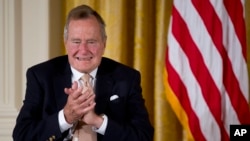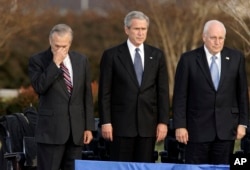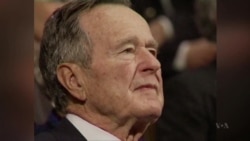After years of restraint, former U.S. president George H.W. Bush is offering a harsh critique of two key figures who served in the administration of his son, George W. Bush, as the country responded to the 2001 terrorist attacks in the U.S. and started wars in Iraq and Afghanistan.
The elder Bush, now 91 and frail from a form of Parkinson's disease, leveled sharp attacks against former vice president Dick Cheney and former defense secretary Donald Rumsfeld - two of the most prominent officials in the younger Bush's administration and architects of the U.S. government's fight against global terrorism.
The elder Bush offered his views in a new authorized biography, Destiny and Power: The American Odyssey of George Herbert Walker Bush, by Pulitzer Prize winning author Jon Meacham.
Bush said Cheney had "his own empire" in the White House while serving as the younger Bush's vice president from 2001 to 2009. Bush senior said Cheney, who had been his defense secretary while he was president from 1989 to 1993, asserted too much "hardline" influence in the American halls of power.
"He just became very hardline and very different from the Dick Cheney I knew and worked with," the elder Bush said, attributing it to the U.S. facing the reality of the 2001 terrorist attacks on New York and the Pentagon. "Just iron ass. His seeming knuckling under to the real hard-charging guys who want to fight about everything, use force to get our way in the Middle East."
The elder Bush described Rumsfeld as having a "lack of humility, a lack of seeing what the other guy thinks. He's more kick ass and take names, take numbers."
"Rumsfeld was an arrogant fellow and self-assured, swagger," Bush recalled.
The elder Bush, the country's 41st president, did not spare his son, the 43rd president, from criticism, while allowing, "He's my son, he did his best and I'm for him." He did not disagree with his son about the U.S. invasion of Iraq in 2003 and the subsequent toppling of Iraqi dictator Saddam Hussein. The elder Bush called them "proud moments" in American history.
Bush senior blamed his son for allowing Cheney and Rumsfeld to exert their clout and for overblown rhetoric on his own part.
He cited his son's 2002 State of the Union address in which he described an "axis of evil" that included Iran, North Korea and Iraq.
"Hot rhetoric is pretty easy to get headlines," the elder Bush said, "but it doesn't necessarily solve the diplomatic problem. You go back to the 'axis of evil' and these things and I think that might be historically proved to be not benefiting anything."
The New York Times said Meacham showed Cheney the elder Bush's comments and the former vice president described them as "fascinating." Cheney did not argue with the thought that the terrorist attacks had changed him, acknowledging that he was "much harder-line after 9/11 than I was before."
Release of the book comes as a third Bush, former Florida governor Jeb Bush, is seeking the 2016 Republican nomination for president. Political surveys currently show him trailing far behind other contenders.
Watch video report from VOA's Zlatica Hoke:







